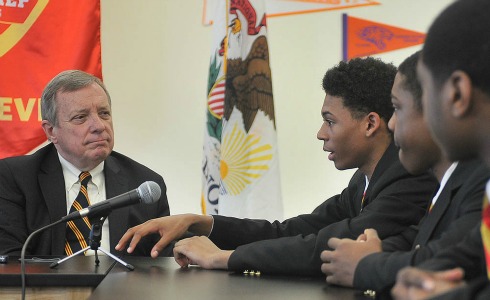 U.S. Sen. Dick Durbin, D-Ill., left, spoke with students from the all-male Urban Prep Academy- West Campus Friday, April 12, 2013 about growing up in some of Chicago’s more dangerous communities. His visit to the school, located in the Lawndale community on the West Side of Chicago, came ahead of the U.S. Senate’s vote-down of national gun legislation. Defender/Worsom Robinson
U.S. Sen. Dick Durbin, D-Ill., left, spoke with students from the all-male Urban Prep Academy- West Campus Friday, April 12, 2013 about growing up in some of Chicago’s more dangerous communities. His visit to the school, located in the Lawndale community on the West Side of Chicago, came ahead of the U.S. Senate’s vote-down of national gun legislation. Defender/Worsom Robinson
WASHINGTON — President Barack Obama and his gun control allies say Senate rejection of expanded background checks and other restrictions won’t stop their drive to reduce firearms violence. But their path to enacting gun curbs this year seems blocked by the National Rifle Association, and supporters of restrictions appear befuddled about what it will take to push legislation through this Congress.
The Senate planned to vote Thursday on two more amendments to a gun control bill. One by Sen. John Barrasso, R-Wyo., would cut aid to state and local governments that release information on gun owners. Another by Sens. Tom Harkin, D-Iowa, and Lamar Alexander, R-Tenn., would bolster federal mental health programs.
But just four months after a gunman killed 20 children and six adults at an elementary school in Newtown, Conn., the Senate proved unwilling Wednesday to approve the key elements of President Barack Obama’s response to the massacre. Lawmakers rejected broader federal background checks and bans on assault weapons and high-capacity ammunition magazines, jarring gun control backers who thought Newtown would spur Congress to act and delivering a victory for the NRA and a defeat for Obama.
“I see this as just Round One,” the president said at the White House, surrounded by relatives of Newtown’s victims and badly wounded former Rep. Gabrielle Giffords.
Looking ahead to the 2014 congressional elections, he added, “If this Congress refuses to listen to the American people and pass common-sense gun legislation, then the real impact is going to have to come from the voters.”
Obama blamed lawmakers’ fear that “the gun lobby would spend a lot of money” and accuse them of opposing the Second Amendment’s right to bear arms.
But opponents of the restrictions — which would have been the most meaningful gun curbs approved by Congress in two decades — said the curbs were defeated because they wouldn’t have worked.
Sen. Jim Inhofe, R-Okla., said most proposals were “predicated on one assumption that somehow we think that the criminal element will single out this one law to comply with.”
Added Sen. Richard Shelby, R-Ala., of the expanded background check plan, “This is the first step in the erosion of my rights under the Second Amendment.”
The day was not a complete victory for the NRA. Senators defeated one GOP amendment requiring states that let people carry concealed weapons to honor other states’ concealed carry permits. Also rejected was a Republican proposal letting some veterans with mental problems have firearms unless a court blocks them from getting the weapons.
But when the votes were over, it was gun control advocates who seemed most perplexed about what it would take to succeed. Though an AP-GfK poll shows support for stricter gun laws receding a bit, surveys have also shown 8 in 10 or more people backing expanded background checks.
“There’s never been a bigger disconnect between where the American public is on an issue and where the Senate ended up,” said Sen. Chris Murphy, D-Conn.
“Tragically, it may take more mass killings,” said Sen. Richard Blumenthal, D-Conn.
Sen. Joe Manchin, D-W.Va., who helped craft the bipartisan plan widening background checks, said he would continue talking to other senators to see whether there were changes he could make that would attract their votes. But he conceded he had no answer.
“If I knew, we wouldn’t be talking because it would have passed,” he told a reporter.
No. 2 Senate leader Richard Durbin, D-Ill., was among several Democrats who joined Obama in saying Wednesday’s roll calls left them with an issue to take to voters.
“We’re now in the world of Gabby Giffords and Mayor Bloomberg and organizations that are organized to come out and support those who vote for gun safety and oppose those who don’t,” he said, referring to wealthy New York Mayor Michael Bloomberg, who has been financing gun control efforts.
